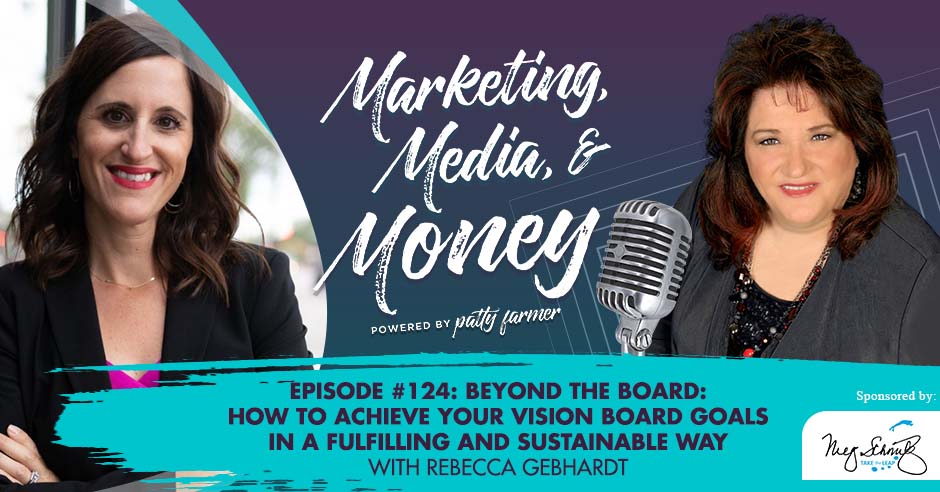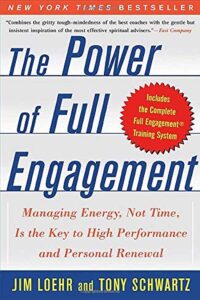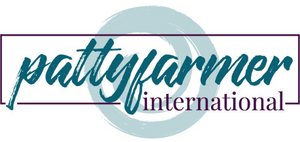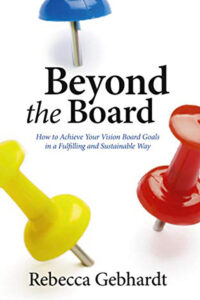Want to know the 7 key areas
needed to ramp up your business?

Beyond The Board: How To Achieve Your Vision Board Goals In A Fulfilling And Sustainable Way With Rebecca Gebhardt (Episode 124)

Click on the icon to listen to this episode on your favorite podcast platform.
Rebecca’s Gift: Free Resources
Rebecca’s #1 Marketing, Media & Money Strategy
DID YOU LIKE THIS EPISODE? PLEASE GIVE IT A RATING AND REVIEW
About Rebecca Gebhardt
 Rebecca Gebhardt is the founder of Rise Up Consulting, and the Best-Selling Author of Beyond the Board: How to Achieve Your Vision Board Goals in a Fulfilling and Sustainable Way. Rebecca has built sales teams that have generated over $50 million in revenue. She now specializes in working with corporate sales leadership teams focused on developing their sales leadership benches with immediate impact on recruiting, retention, and revenue.
Rebecca Gebhardt is the founder of Rise Up Consulting, and the Best-Selling Author of Beyond the Board: How to Achieve Your Vision Board Goals in a Fulfilling and Sustainable Way. Rebecca has built sales teams that have generated over $50 million in revenue. She now specializes in working with corporate sales leadership teams focused on developing their sales leadership benches with immediate impact on recruiting, retention, and revenue.Resources and Important Links
- Rise Up Consulting
- Beyond the Board: How To Achieve Your Vision Board Goals in a Fulfilling and Sustainable Way
- Rebecca Gebhardt on LinkedIn
- @RiseWithRebecca on Instagram
- Rebecca’s Gift: Free Resources
- Free Marketing, Media, & Money Assessment
- Check Out Our Sponsor
- Everyone Deserves a Great Manager
- Selling Power
- The Power of Full Engagement
- Drive
- HOW TO FIND YOUR WHY: THE SEVEN LEVELS DEEP EXERCISE
Grab Your Free Marketing, Media, & Money Assessment
Meet Our Sponsor
The Marketing, Media, & Money Podcast (and magazine) would like to thank our sponsor Meg Schmitz, founder of Take the Leap franchise consulting company.
The franchise industry is booming as people look to diversify their income streams with essential businesses, without having to quit their day job. If you have ever considered what it would be like to own your own business with the security of a solid brand behind you, schedule a call with Meg. The conversation is free, and the insights are priceless. Click Here to learn more.
Beyond The Board: How To Achieve Your Vision Board Goals In A Fulfilling And Sustainable Way With Rebecca Gebhardt
I'm looking forward to sharing our industry expert with you. We're going to be talking about one of my favorite topics. I'm sure it's one of yours if you're in business because we're going to be talking about sales and, specifically, sales leadership, not always two words that people put together but should. Do you ever wonder why there's a plethora of sales training but virtually nothing for sales leaders that are transitioning into new roles? We're going to be talking about that too.
Let me tell you a little bit about our guest. Rebecca Gebhardt is the Founder of Rise Up Consulting and the best-selling author of Beyond the Board: How To Achieve Your Vision Board Goals in a Fulfilling and Sustainable Way. Rebecca has built sales teams that have generated over $50 million in revenue. She now specializes in working with corporate sales leadership teams, focusing on developing their sales leadership benches with immediate impact on recruiting, retention, and revenue. Thank you so much for being here with me, Rebecca.
Thanks so much for having me.
I'm excited. Before we jump in, I want to share with my audience exactly how this came about because there isn't always a story when someone comes on my show. Sometimes it's just that they're talking about a topic that I know my audience needs to hear. Sometimes there is a story, and this is one of those. It is an interesting story, so I'm going to share it. Bear with me, audience. I think you're going to like it.
Rebecca and I are connected on LinkedIn. I follow her, and she is probably one of a handful of people that I pretty much read everything she posts and the comments, too. Sometimes, in case you didn't know, here's a tip for you. The gold is in the comments. A lot of people like to comment and say things like, "That's a great insight. Thank you for sharing that."
There are always people who like to have conversations, and they add their little bits of gold. Rebecca comes back and answers what they said. Pretty soon, there's this whole conversation in the comments that's just as powerful and insightful as what her post was in the beginning. I love them. While I was doing that, she was talking one day about something that led me to go beyond the vision board. I thought that was super interesting.
When I looked it up, I realized that she had written this book about it. I love vision boards and choose to do mine on a Pinterest secret board. I visually see my board every single day within the first fifteen minutes of waking up, I thought, "I want to get some perspective about this." I purchased her book. Once I purchased her book, I realized, "This is amazing."
I posted on social media and invited my people and my network to see if they wanted to have a book club around her book. We haven't launched it yet, so you probably still have time to reach out to us if you wanted to. All of that happened, and then I reached out to her and said, "It is so fabulous. Would you like to come on my show?"
I feel like this is something that is super powerful. It’s great for you to up your sales skills and your leadership skills. We all need and want that. With that story, this is how she got here. I'm going to tell you, this is going to be one of those keepers. Get your pen and paper out because I know she's going to share with us some writer downers. Rebecca, no pressure. I just set you up for all that. I love how this whole show interview came about. That's my perspective on it. Feel free to jump in from yours.
I've watched your work. We know a lot of the same people and when you reached out, it always makes me feel good. I wrote that book, Beyond the Board. It came out in 2020, right before COVID, February 29th, before the world ended. I didn't know at the time how it would keep showing up and keep helping people as much as it has.
That is such a joy to me, where we can simplify how someone's going to go about and achieve their goals and a little process for it. We all get fired up about our goal. What happens is we don't know what we're supposed to do and whom we need to have around us, and we don't connect to our purpose, our passion, or our why enough. It's fun when I get messages from you and from other people about this book. I'm excited you're going to be doing it for your book club.
Thank you so much. I have to tell you and I want to share with the audience what solidified it for me. I love that you said that the problem that keeps people from reaching their goals isn't enough information. The issue is that we have too much information, and it's incredibly challenging to focus on what matters.
A truer statement has never been said because I believe that it's true. Even in my business in marketing, I always have to tell people all the time that what stands in their way is they keep thinking that they need to get more information. “Once I get that information, then I'll be ready to go.” I'm always telling them, “We're not in the information business. Google's in the information business. We're in the transformation business." That is so interesting and you just said it so eloquently and to the heart of the matter. I feel like that is something that maybe people don't even realize, but that is a big problem.
It's a huge problem. I wanted to call the book, Simplify to Multiply: Things to Multiply Your Income or Multiply Your Impact. That was already a handle that was taken on Instagram. I thought, "If I'm going to do anything beyond this, I have to make a name of a book that I can transfer. It is. We get so distracted. I do the comparison game. I was doing this as we started Q3. Beginning in Q3, looking at my goals for the rest of 2022, I'm looking at what other people are doing and I'm getting distracted. "Should I go do this? Should I go do that? That's a great idea."
It takes a ton of discipline to keep it simple. It takes a ton of discipline to focus on what we want, what we're good at, and what our slight edge and competitive advantage are going to be to win our game. We way overcomplicate matters. That's what inhibits most people from having the true success that they deserve and that they want.
One of the things that I believe is that good leaders are great communicators. That is so important. I love some of the stats that you put up on your site. A couple that stood out to me was that you said that according to a recent survey you conducted with over 150 respondents, 80% of the sales leaders said that they received no training once they got into sales leadership. That's crazy. The Harvard Business Review says that the average age that someone gets their first leadership promotion is age 30. Their first leadership training is at age 42. That is even crazier. Can you talk a little bit about that because I think that is amazing?
I got that Harvard Business Review stat for the book, Everyone Deserves a Great Manager. I saw that and I put the book down. I never put books down because I'm always reading something. I went, "This is the problem." I looked at my industry of sales because, at the time, I was coaching salespeople and sales leaders. I didn't specifically niche to the leaderboard to leadership transition, the emerging and aspiring sales leaders, until I saw that stat.
I went, "How does this apply to our industry?" I couldn't find any information, which was so annoying to me. I was like, "This is an ignored thing. Not only is it ignored, there's no data." Long story short, I had contacted Gerhard Gschwandtner of Selling Power. I asked him. It was like me going to the teacher for the answer. I said, "Gerhard, do you have any information on this?" I respect Selling Power. He said, "I don't. I've sat in some of these large corporations you've already mentioned in this show and they have emerging sales leadership training. Go get the research yourself." I did.
In March of 2021, I embarked on this research and I had sales leaders around the world reply, and I was shocked that 80% of them said they got no training. I didn't do a stat because it's male-dominated, and men are more, "Figure it out. If you're meant for this role, you'll figure it out." 80% of sales leaders are men. I don't think it's a sexist thing like that. I don't think it's by gender, but there's so much to the sales culture. It feels like a fraternity or a sorority rush. Prove yourself in sales. Prove yourself as a sales leader.
If you break down that status quo thinking, it's so expensive to take top producers out of sales or out of any individual contributor role, whether that's marketing or manufacturing, no matter what you do. I started getting more research, and people can find that on my website. I can give it to them. We can talk about how they can get the whole survey results at the end.
I started digging into that and then started getting a lot more emerging sales leadership clients, and we thought, "That frontline sales leader has all of the impact on the results that people get." The old Gallup poll from years ago that there's no greater indicator of someone's success than their direct manager. If the direct manager is not being trained, how much success is the rest of that organization going to have?
Things just spiraled. I got an answer, and then I asked another question. That led to another problem. It's a huge issue. The organizations that I work with believe in strengthening their sales leadership pipelines, setting up their leaders for success, and they don't want the turnover that plagues sales. The average leader's nineteen months in a role. The average salesperson's eighteen months in a role.
Those are probably correlated. If we can figure some of this stuff out and strengthen sales leaders, that impact goes all over the organization. It's been fun to see how that has impacted the recruiting ability of those leaders to attract salespeople and the retention that they're able to have because they're managing and they're being great leaders. The revenue increases because better coach teams produce a lot more revenue.
You can see that there's a correlation between that. Do you think that there is a correlation between sales leadership training or lack thereof with those eighteen months and burnout? When you're trained and you feel good and confident in what you know you're doing, it's not as draining. It doesn't take as much energy. If anything, it pumps your energy. Whereas when you don't and you always feel like, "I wish I knew more," like I said in the beginning that we don't feel like we know enough, it seems to me that there would be a direct correlation between those things.
I intuitively feel it. I don't know what the specific data says about it. There are things you can go, "That would make so much sense." I see it with my clients and I don't think that's a big enough sample size to make the data correlation, but yes, absolutely. If you're empowered with training, you are more confident. When a leader is trained and being developed, they can train and develop their salespeople, and people leave.
I do know the numbers on this. I don't have the numbers on Gen Z, but 90% of Millennials expect to be developed and given opportunities for growth at work. 70% will leave if they're not given those opportunities. 90% of all high performers will leave a job if they're not given opportunities for growth. Who gives them those opportunities? Their leader. If their leader has not given opportunities and training, it's a ripple effect. You can't give what you don't have and you haven't been given.
My clients have seen retention rates go up because their leaders are more empowered. They think through this. You mentioned energy and force. Energy management is a huge thing that I talk about. Time management is the number one struggle for new sales leaders. If you can get those things right, if you're energized by the purpose behind what you're doing, you feel confident about it, you can focus on the right things, your energy goes way up. You're not going to hit that burnout. Sales is a churn and burn industry. If the sales leader can alter that a little bit, it has huge ramifications on the team.

Vision Board: Sales is a churn-and-burn industry, so if you can bring a purpose to what you are doing and feel confident about it, your energy will go way up. You're not going to hit that burnout.
I agree with you. Time and energy management is so important. It's funny that people are talking about it now. Whenever people would talk about things, the sentence used to be your time, your resources and your money. Now, we're talking about your time, your resources, your money, and your energy.
I don't think we were talking about that years ago. Maybe we didn't even realize that that was something that came out of the pandemic. I don't know, but I do know that I have found that managing my energy is so important. It's so important to how I can leverage my time. Can we talk a little bit about that? I know that is something that you talk about.
We can talk about that. I love talking about that. There's only so much time that we have any given day. You cannot expand your time, but you can expand your energy. There is a wonderful book called The Power of Full Engagement. My old sales director gave me that book in 2010, and I still have her little note in the book.

The Power of Full Engagement: Managing Energy, Not Time, Is the Key to High Performance and Personal Renewal
It was such a game-changer for me. I've been in sales for 22 years. I thought that you had to work hard to get results, which is true. I took that a step further, and I said, "In order to work hard, it must have to be hard. It has to be a grind. It has to feel bad in order for me to feel like I deserve success." That is not true when you are going to work and you're looking at the number of hours you work.
One of the things that I educate my sales leaders on is, "You have to work a certain number of hours in a day salespeople do. The more quality calls you get, the more sales you're going to make. That is the law of averages. It doesn't matter how many hours a day that you work. That is not the equivalent of, ‘I put in a hard day's work.’ It's the value per hour of work.”
You get nerdy about what a valuable hour of work looks like. It looks like, "Did you do your best? Did you bring your best energy there?" Your best energy is about your spiritual energy, which is your passion, your purpose, and your "why." It's about your physical energy. Are you awake enough? Did you eat healthy foods that fueled your system?
It's about your emotional energy of that whole emotional intelligence. Are you excited about what you're doing? Are you motivated by it? I personally think the mental energy is the toughest thing for people now in this distracted world, but it's your focus. We can only focus for so long. Anyway, if you get those four energies which The Power of Full Engagement dives into and align those, you get your best self and you get forceful positive energy that produces better results.
I agree with you. I remember back in the day when I filled that resumes before I was self-employed. It was such a huge thing on your resume to be able to say you could multitask. That was the buzzword. Could you multitask? Now, that has gone out the window. Nobody cares if you can multitask. What we want to know is, “Can you focus?”
It's amazing how there has been this shift. This little short time that people can focus with social media and all the things there. We don't want somebody who can do twenty things at the same time because we now know that you're probably not doing them as well. That is interesting in how that has shifted.
You've touched on a few of the things in order to manage your time and energy. I 100% agree with that. I also find that the better I am about communicating, the shorter my sales cycle is and the more increased sales that I have in less time which works for me. Communication has always been key for me in something that I work on. I love that you said emotional intelligence because that is also important to me and something I work on all the time. I think that it is important. Are there a few others in this time and energy management that people should be looking at?
There are certain times of day when we're better, we focus better, and we have better discipline. I am a morning person. Some people are night owls. Daniel Pink talked about this in his book, Drive. It's these energetic flows of the day. I have restructured my working days around my own energy and I don't make any apologies for it anymore.

Vision Board: There are certain times of day people focus better. So you have to restructure your working days around that and don't make any apologies for it.
This is being done at 9:00 Central Standard Time in the morning. This is my best self. I would never have agreed to record this with you at 2:00 in the afternoon. That is my worst time of day. You'd be like, "How is this woman successful?" I don't appear as successful at 2:30 in the afternoon. All these gurus always say, "Get up at 4:00 AM and go hike Kilimanjaro. Eat your protein shake. Do all this stuff." That doesn't work for me.
When I work out in the morning, I'm exhausted by 10:30 in the morning. I have flipped my calendar around my best energetic times of day. This is what I coach my clients as well. We can get more done in an hour of work than all three hours in the afternoon, or there are three hours of low energy throughout the day.
People have not thought about that. When are you at your best? Even those times of day, schedule your best work then. I wrote my entire book Beyond the Board in 2 months from 9:00 until 12:00 in the morning, unless I had client calls. We were doing a kitchen remodel at the same time, and I joked with our contractor, "I wrote a book faster than you remodeled my kitchen."
I love that. That is amazing, because it gave you something that you could see. I like what you're talking about right now. I'm in marketing, so I look at it a little differently but it’s the same concept. I call that doing revenue-generating activities in those times, which is super important. My time is aligned with yours, and then, I say that the reason we do those things is that we can do things that feed our soul. The more things you do in the times that generate revenue, the more time you have to do things that feed your soul. Finding that time is important.
My time is totally aligned with you. I don't let anything affect my revenue-generating time. In the afternoon, 2:00, like what you said, that is when I do things that feed my soul or relationship-building activities. I can get a lot done at 3:00 in the afternoon that wouldn't be revenue-generating time for me, for sure.
Relationship-building calls that lead to opportunities that generate revenue while I'm sitting on my couch, having a cup of coffee with my puppy in my lap does a lot for feeding my soul and my energy. That comes through. Knowing when those times are for you are key. You're right. I make no apologies for it, either. It is very important because the numbers don't lie. Math does not lie. It is something so easy to track and be able to see.
Not only that, but it takes a lot of energy to force yourself to do something that you don't want to do. You're not real good at it anyway. You think it's something you should do, and you're doing it in the wrong time. It's going to make it so much harder and take up so much energy. It makes sense, but sometimes people don't realize this. I'm loving that we're having this conversation because I'm hoping that at least one person out there is going, "I never thought of that.” It is so important in pretty much almost everything you do.
Flip your day around. I work out during that 2:30 time. I took a nap, which is very healthy as well. That is not a lazy thing to do. You get two days. Some of the most successful people in history have been nappers. You and I are self-employed. We run our own businesses. If someone's reading to this where maybe they've got their side gig or they're still employed, they go, "I don't have that option," you absolutely have that option. It's about communicating and knowing when you're doing your best work.
In sales, I would have to meet with someone and I still do. If there is a prospect, the only time we can have a discovery call or I can do a proposal for them is 3:00 in the afternoon, I will do that. We will meet people when we need to meet those revenue-generating times. You can also communicate when you're best effective. I had a client. I said, "How can I help you?" He said, "Can you let my girlfriend know that it's okay for me to go home and take a 15-minute nap?" I said, "Absolutely. It's so smart of you to do that." We have this shift we have to make in our mind. If we're not working and not leaving it all out there, we're somehow failing ourselves.
It's not just about the amount of energy and doing your best work. The conversation around burnout right now is all about how much time you're working. It's still trapped in, "We're overworking people." It's not just about the amount of time that people are working and the energy they're putting into that. It's the type of work they're doing.
I don't want to go into a ton about this because people can go search for this, but I'm also a certified Kolbe Consultant, and it's about having people do their best work that's inherent of them and naturally good for them. I was so tired in sales because working someone else's system was against my grain.

Vision Board: If you want people to do their best work, their work has to be inherent and naturally good for them. If you make them work someone else's system, that will go against their grain.
You're a strategist, too. Depending on how you do your best work and how you're inherently wired, that's work you should be doing. In my book, Beyond the Board, I created a strategy for achieving goals. That was me in my zone of genius. That was me doing work that aligned with my inner strengths. If I had to go follow someone else's system, that would've burnt me out. That's important, too. Do you flow with the work you're doing, or is it against your grain? Does it burn you out faster than it should be? You don't have to quit your job. You just might need a shift in your job responsibilities as well.
When I was in the corporate world, it’s one of the things that I found when I was managing people and I was the sales leader. It didn't mean always that they weren't a good employee. Sometimes it meant they were driving the wrong vehicle. As soon as you could realize that, and they did, too, you could have this conversation. You would move or shift the responsibilities.
All of a sudden, it's like you had this rock star and you're like, "Where were we hiding that?" That is key, but what is interesting is that it is easier for us, for whatever reason, to see it in other people than it is to see it in ourselves. We don't ask ourselves the right questions. Maybe we've been doing it for so long and we don't recognize it.
For whatever reason, that was one of the things that I thought was interesting about your book and reading all of your posts on LinkedIn. When I read them, it was like, "That was interesting." If you're going to read something but not reflect on it, I'm not going to say it's a waste, but you did it halfway. It's about not reading the book from cover to cover, but it's like what you said when you were reading that and you got that stat and you put the book down.
That is the power of a good book. If something makes you stop and say, "I want to think about that," good. Put a bookmark in there, you can go back to it. What is that telling you? Is it something about how you do your business or something about yourself? Is this an opportunity for personal development or business development? Maybe it is a great idea or an enhancement to something you're already doing. It's the missing piece or it fills a gap. Whatever it is, I do feel like it is very important to take the time to do it.
If people saw it, they would think I was off my rocker. There are times every quarter that I set a date with myself. Sometimes, I check myself into a four-star hotel. Sometimes I'm doing it in my living room. That depends on my travel schedule. Sometimes, I will put up a flip chart, get up, and write. I sit down, look at it, reflect on it, think about it, and then Patty says, "That looks good on paper, but it doesn't work for me." Patty Farmer gets up and I have that whole conversation with myself. My husband says, "You talk to yourself?" I'm like, "Sometimes you got to talk to an expert." The fact of the matter is, however you have to do it. I always go to my coach, too.
Sometimes, you just have to ask yourself and get real with yourself and have some real talk about how this is aligning with what you want. Again, sometimes people don't have that conversation because they don't think that they can make changes. In actuality, the changes don't have to be these big huge "quit your job" or "change your whole business" things. They could be small things. What would you say are a few of the small changes that people could do, a few simple things, or maybe a few simple questions to ask themselves?
Questions to ask when what? When they're thinking about, "Should I change something up?"
Something's just not aligning with them and they know that it's not right, but they don't know how to shift, or they don't even know what that looks like.
I don't know if they're necessarily questions, but some tips. What ticks me off is always a good question about other people. The reason that's a good one is that I'm going to get a little philosophical. What we see in others, we see in ourselves. What ticks us off about other people is usually a blind spot that we're either ashamed of or we want to change about ourselves.
I have done this so many times where I find myself judging other people or annoyed with comments people make. If it annoys me, I've learned that's something I need to change in myself. It's not about them, it's about me. That would be a question. Another question to ask, too, is when we talk about, "Is it aligned to what I'm doing?" aligned doesn't always mean, "Is it going to be easy?"
When we align to what we want, that's going to be hard. Success takes hard work. It takes growth, comfort zone breaking, and getting uncomfortable to align to our truer selves. That's growth. That's also a question. Why do I want it? That's what I have in Beyond the Board. Why do I want to do this? Why is this goal so important?
There's an exercise in the book called HOW TO FIND YOUR WHY: THE SEVEN LEVELS DEEP EXERCISE. You keep getting to the real why. That's when you connect to that purpose. If you can get that spiritual force, that purpose behind what you're doing, the power behind what you do is so much stronger. Your conviction comes out. You get more results for the effort that you're making. Those are a few things that I would sit with.
You just said, "I asked Patty and Patty Farmer, you got to go back and talk to an expert. You talk to your coach." Talk to the people around you. Whom you have around you matters. The people who know you at your worst, who know you at your best, will give you the insight if you ask them. It's always shocking. I've done this before in the past, "What do you think I'm good at? What do you think I should do?" The answers that came back were insightful.
No one mentioned the things I thought I was good at. It was like it was in my head. The things that they said was, " Rebecca, this is your God-given talent. This skillset is what you should be using." I didn't think I was good at that because I saw other people who were better. Those couple of questions or exercises are very helpful, and then some self-awareness about, "When's my best time to work? How should I do this strategy? What does success mean to me?" You lead a more fulfilling life.
"What does success mean to me?" is such a good one because a lot of times, social media being what it is, we see other people and we think that's what it should be for us, but it doesn't align with us because it isn't what we want. Some people want to have a yacht, ten vacation weeks a year, and some people want to stop working at 3:00 so they can take their kids to gymnastics.
"What is that to you?" That is a very important question. I love the exercise. I haven't got that far in the book yet. I can't wait to do it. Let's go ahead and talk about the book. We keep referring to the book as Beyond the Board, which it is but it does have a subtitle. It's Beyond the Board: How To Achieve Your Vision Board Goals in a Fulfilling and Sustainable Way. I love the name Beyond the Board, for sure. That's a great hashtag, by the way.
I feel like the whole subtitle with it goes deeper as they should. It does tell you what you will get out of the book. I like that. It was a game-changer. I'm not even done with the book. I want to read it first before the book club starts. That way, if I'm going to facilitate it, I have read it a few times. That is good, but I love that you talk about simplification because that is important. There are a lot of people that are looking for that.
Tell us about the book. What was your vision for the book? What are you the most passionate about now that it's done? Rather than me trying to delve into that for you, I'm going to let you speak for yourself and tell us a little bit about the book, and you're talking to my audience. What would you love for them to get out of the book, and why did you write it?
There's all this data on writing your goals down and the extra step of visualization, attaching feelings to it. The whole point behind a vision board is to attach your feelings. My vision board's on my wall. I see the numbers. I see the places we're going to be going that we have done. I see the type of person that I want to be like fitness levels, all of that, the type of wife and mom and all of that. That's on the vision board. That's a very strong thing.
Most people go through life just comparing themselves to their neighbors or the people in their circle. They go, "How am I doing? How successful am I compared to Bruce or Karen?" I want to help people focus on what success means to them because the picture of success that people show in magazines and on social media isn't always what success means to someone else. If you can, look ahead and behind you. Attach, when we're all dead, what is our legacy going to be? What's our final report card going to be? You reverse engineer that to how happy, how present, and how successful you were based on what your definition is. That was my vision is to get the big picture.
It's not the amount of money you make. It's what you're going to be giving. It's your impact on other people. Did you use the talents that you were given to help other people and also find success for yourself? I broke it down into, "What do you want? Why do you want it? Who do you need to be? Who do you have to have around you? How?"
The "how" part is the part that messes everybody up because they don't think about, "What are the actual actions? How do they tie their metrics?" When you're working with marketing clients or when I'm working with salespeople, there are metrics based on closing percentages, conversion rates, and the funnel. It’s all of these things. The numbers don't lie.
You got to pay attention to your numbers. You get through your numbers, and you're like, "Am I willing to put in that amount of work to get that number?" If you are, then do it. If you're not, change your goal or increase your skillset. You got to figure it out. That was what it was, and then that time and energy. Energy management is one chapter. Time management is another chapter.
Those two are about the planning and the execution of that how. If you can look at that and simplify what you need to do, you go, "It's not so confusing. It's not this big secret that only some people are privy to. It's not just the boys club." Everybody can have this success. That's what's so fun about people who read this book and reply back to me. If you are reading this and you are going to get the book, please send me a message or an email about what it's done. It makes me feel so good of that impact. That's where the power is aligning what you want to how you should go about getting it.
I like that. Even when I'm working with my clients or potential clients, a lot of times they'll say that to me, "What is your definition of success?" I said, "My definition of success will probably not be the same as yours." The last thing I want is for somebody to think, "If you work with me, I can help you get my definition of success."
It isn't about me at all, it's about them, and what is it that they want to do. You are right in the sense that math doesn't lie. You can look at these numbers and you can say, "Do I need to increase my skillset?" The fact of the matter is, for me, my number one thing, like a lot of people, is time freedom. That is so important to me.
When you ask yourself to get time freedom, what are those things that I need to do? If it equates to this dollar amount of money that you feel that you need to make in order to have the things that you want to have, you could either have to get a better skillset. You have to be able to do it faster. Before you know what you're going to do, the "how," you have to know the "why." The "why" is what will keep people moving forward.
I'm going to share this brief story that was a game-changer for me like you changed your book. I was speaking once and I was talking about lifestyle and how that worked with your marketing. There was this woman in the front row. All while I was talking, I could see the change in her demeanor. All of a sudden, I could see these tears rolling down her face.
It was so hard for me not to react to that while I was on stage. When I got done speaking, I noticed that she immediately got up and started to run out of the room. It totally affected me. I ran up to her and I tapped her on the shoulder and she turned around, and immediately I was like, "I feel like you had some type of response. Are you okay?" She said yes and she was crying.
I said, "Can I give you a hug?" She said yes. She said, "That made an impact on me. Can I share with you what it is that motivates me to pick up the phone every day and make sales calls?" I was like, "Sure. I would love to hear that." Here's what she said, and this was the biggest game-changer for me. I get choked up every time I tell this story.
She said, "What's important to me is that I would love to be able to invite people over to my house and have matching appliances." I was like, "Oh, my gosh." It's amazing, too, that I still get choked up. Bear with me. Sorry about that. It made me realize in this moment that she was picking up the phone, making those sales calls because her "why" was that important to her.
To some of the people that are reading, you're thinking, "Really? That was it?" They're all thinking about all of this. We all don't have the same "why." If your "why" is strong, and in her case, it was strong enough to get her to pick up the phone and do that, it was powerful and it was very important to me at that moment in time. It was a game-changer for me to realize that everybody had a different "why." Everybody had a different reason why they did it. Everybody's lifestyle was going to be different.
It shifted the trajectory of my business. By getting that, I'm so thankful and blessed that I learned it early on, but it's an important thing to know. Sometimes you know it about yourself and sometimes you don't. Sometimes you think, "This is what my spouse wants. This is what my family has always done," or whatever those questions are.
You, having this book that's going to help people to get to that "why," it could change the trajectory of their business. It may open their eyes to saying wow. If you've been doing what you do for several years, you still have time to change that. I don't always get on my show and endorse everything, but I will say that I believe that this book could make a difference, and I believe that people should read it. I feel that strongly about it, Rebecca. That's why I'm having a book club about it. I can't tell you how much I appreciate you coming on the show and sharing your insights and your perspective in a way that could be a shift for people. I love it and I appreciate you coming on.
I appreciate you having me on here and sharing that story about the woman in your audience because people will read this, and they'll go, "When was the last time I thought about why I'm doing what I'm doing?" It's a powerful experiment to have. Anyway, thank you for having me on your show.
Thank you. Audience, I know you're going to want to connect with Rebecca. I know you're going to want to read the book. We're going to give you all that information. Rebecca, where is the go-to place for people to go to connect with you?
You can connect with me on LinkedIn. I'm always on LinkedIn, but most definitely on my website, which is RiseUpConsultingGroup.com.
On top of all this great information that Rebecca shared with us, she came with a gift. It’s not just with a gift, with a multitude of gifts, a whole resource of gifts. Tell us a little bit about the gifts.
The main one, which you can find on my website under Free Resources is my eBook, which is the chapter on Energy Management from Beyond the Board. If you go to RiseUpConsultingGroup.com, and you go to Free Resources, you'll find that there. There are other resources you can find as well. If you click on the link to my book, you can get the whole workbook for the book for free. You should read the book. It'll make it better. You could find the whole workbook to work through some of these exercises. Think through what your success means, what you want on your vision board, and what you want out of life.
That is fabulous. Rebecca invited you to connect with her. After you read the book, she wanted to hear and I want to hear what your experience is too. Make sure that you reach out to us. We want to do that. I have to say this is the time, as if you didn't share enough, as if you weren't so generous with your brilliance, which I appreciate. We always like to end our show with what is your number one marketing, media, and money strategy?
Consistency, showing up in the same way, and speaking about the same topics in the same cadence, week-after-week, year-after-year. It builds trust with your audience, and it syncs your message in and your impact goes a lot further.
Thank you so much, Rebecca. I appreciate you being here. Thank you to our audience. I appreciate you showing up, like she said, consistently, week-after-week, to read. I love doing this show. I love doing our sister magazine, Marketing, Media, & Money. I appreciate you reading and showing up. Thank you so much for that. Again, thank you so much, Rebecca. It was a joy to have you on the show.
It’s fun to be here. Thank you, Patty.
To the audience, thank you so much. I hope the rest of your week is phenomenal. Until next week. Have a great week.

